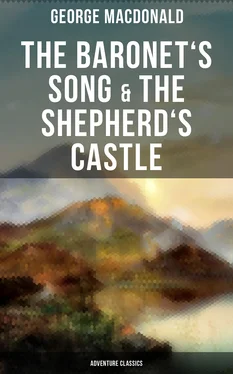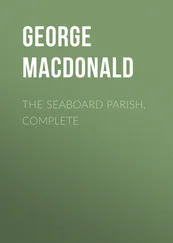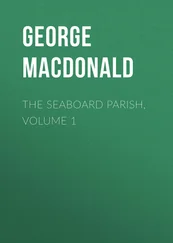When she came into the cottage, she stared with astonishment to see no Angus on the floor. Gibbie, who had lain down again in much pain, made signs that he had let him go: whereupon such a look of relief came over her countenance that he was filled with fresh gladness, and was if possible more satisfied still with what he had done.
It was late before Robert returned—alone, weary, and disappointed. The magistrate was from home; he had waited for him as long as he dared; but at length, both because of his wife's unpleasant position, and the danger to himself if he longer delayed his journey across the mountain, seeing it threatened a storm, and there was no moon, he set out. That he too was relieved to find no Angus there, he did not attempt to conceal. The next day he went to see him, and told him that, to please Gibbie, he had consented to say nothing more about the affair. Angus could not help being sullen, but he judged it wise to behave as well as he could, kept his temper therefore, and said he was sorry he had been so hasty, but that Robert had punished him pretty well, for it would be weeks before he recovered the blow on the head he had given him. So they parted on tolerable terms, and there was no further persecution of Gibbie from that quarter.
It was some time before he was able to be out again, but no hour spent with Janet was lost.
Table of Contents
That winter the old people were greatly tried with rheumatism; for not only were the frosts severe, but there was much rain between. Their children did all in their power to minister to their wants, and Gibbie was nurse as well as shepherd. He who when a child had sought his place in the live universe by attending on drunk people and helping them home through the midnight streets, might have felt himself promoted considerably in having the necessities of such as Robert and Janet to minister to, but he never thought of that. It made him a little mournful sometimes to think that he could not read to them. Janet, however, was generally able to read aloud. Robert, being also asthmatic, suffered more than she, and was at times a little impatient.
Gibbie still occupied his heather-bed on the floor, and it was part of his business, as nurse, to keep up a good fire on the hearth: peats, happily, were plentiful. Awake for this cause, he heard in the middle of one night, the following dialogue between the husband and wife.
"I'm growin' terrible auld, Janet," said Robert. "It's a sair thing this auld age, an' I canna bring mysel' content wi' 't. Ye see I haena been used till't."
"That's true, Robert," answered Janet. "Gien we had been born auld, we micht by this time hae been at hame wi't. But syne what wad hae come o' the gran' delicht o' seein' auld age rin hirplin awa' frae the face o' the Auncient o' Days?"
"I wad fain be contentit wi' my lot, thouch," persisted Robert; "but whan I fin' mysel' sae helpless like, I canna get it oot o' my heid 'at the Lord has forsaken me, an' left me to mak an ill best o' 't wantin' him."
"I wadna lat sic a thoucht come intil my heid, Robert, sae lang as I kenned I cudna draw breath nor wag tongue wantin' him, for in him we leeve an' muv an' hae oor bein'. Gien he be the life o' me, what for sud I trible mysel' aboot that life?"
"Ay, lass! but gien ye hed this ashmy, makin' a' yer breist as gien 'twar lined wi' the san' paper 'at they hed been lichtin' a thoosan' or twa lucifer spunks upo'—ye micht be driven to forget 'at the Lord was yer life—for I can tell ye it's no like haein his breith i' yer nostrils."
"Eh, my bonny laad!" returned Janet with infinite tenderness, "I micht weel forget it! I doobt I wadna be half sae patient as yersel'; but jist to help to haud ye up, I s' tell ye what I think I wad ettle efter. I wad say to mysel' Gien he be the life o' me, I hae no business wi' ony mair o' 't nor he gies me. I hae but to tak ae breath, be 't hard, be 't easy, ane at a time, an' lat him see to the neist himsel'. Here I am, an' here's him; an' 'at he winna lat's ain wark come to ill, that I'm weel sure o'. An' ye micht jist think to yersel', Robert, 'at as ye are born intil the warl', an' here ye are auld intil't—ye may jist think, I say, 'at hoo ye're jist new-born an auld man, an' beginnin' to grow yoong, an' 'at that's yer business. For naither you nor me can be that far frae hame, Robert, an' whan we win there we'll be yoong eneuch, I'm thinkin'; an' no ower yoong, for we'll hae what they say ye canna get doon here—a pair o' auld heids upo' yoong shoothers."
"Eh! but I wuss I may hae ye there, Janet, for I kenna what I wad do wantin' ye. I wad be unco stray up yon'er, gien I had to gang my lane, an' no you to refar till, 'at kens the w'ys o' the place."
"I ken no more about the w'ys o' the place nor yersel', Robert, though I'm thinkin' they'll be unco quaiet an' sensible, seein' 'at a' there maun be gentle fowk. It's eneuch to me 'at I'll be i' the hoose o' my Maister's father; an' my Maister was weel content to gang to that hoose; an' it maun be something by ordinar' 'at was fit for him. But puir simple fowk like oorsel's 'ill hae no need to hing down the heid an' luik like gowks 'at disna ken mainners. Bairns are no expeckit to ken a' the w'ys o' a muckle hoose 'at they hae never been intil i' their lives afore."
"It's no that a'thegither 'at tribles me, Janet; it's mair 'at I'll be expeckit to sing an' luik pleased-like, an' I div not ken hoo it'll be poassible, an' you naegait 'ithin my sicht or my cry, or the hearin' o' my ears."
"Div ye believe this, Robert'—at we're a' ane, jist ane, in Christ Jesus?"
"I canna weel say. I'm no denyin' naething 'at the buik tells me; ye ken me better nor that, Janet; but there's mony a thing it says 'at I dinna ken whether I believe't 'at my ain han', or whether it be only at a' thing 'at ye believe, Janet, 's jist to me as gien I believet it mysel'; an' that's a sair thought, for a man canna be savet e'en by the proxy o' 's ain wife."
"Weel, ye're just muckle whaur I fin' mysel' whiles, Robert; an' I comfort mysel' wi' the houp 'at we'll ken the thing there, 'at maybe we're but tryin' to believe here. But ony gait ye hae pruv't weel 'at you an' me's ane, Robert. Noo we ken frae Scriptur' 'at the Maister cam to mak aye ane o' them 'at was at twa; an' we ken also 'at he conquered Deith; sae he wad never lat Deith mak the ane 'at he had made ane, intil twa again: it's no rizon to think it. For oucht I ken, what luiks like a gangin' awa may be a comin' nearer. An' there may be w'ys o' comin' nearer till ane anither up yon'er 'at we ken naething aboot doon here. There's that laddie, Gibbie: I canna but think 'at gien he hed the tongue to speyk, or aiven gien he cud mak' ony soon' wi' sense intil't, like singin', say, he wad fin' himsel' nearer till's nor he can i' the noo. Wha kens but them 'at's singin' up there afore the throne, may sing so bonny, 'at, i' the pooer o' their braw thouchts, their verra sangs may be like laidders for them to come doon upo', an' hing aboot them 'at they hae left ahin' them, till the time comes for them to gang an' jine them i' the green pasturs aboot the tree o' life."
More of like talk followed, but these words concerning appropinquation in song, although their meaning was not very clear, took such a hold of Gibbie that he heard nothing after, but fell asleep thinking about them.
In the middle of the following night, Janet woke her husband.
"Robert! Robert!" she whispered in his ear, "hearken. I'm thinkin' yon maun be some wee angel come doon to say, 'I ken ye, puir fowk.'"
Robert, scarce daring to draw his breath listened with his heart in his mouth. From somewhere, apparently within the four walls of the cottage, came a low lovely sweet song—something like the piping of a big bird, something like a small human voice.
Читать дальше












